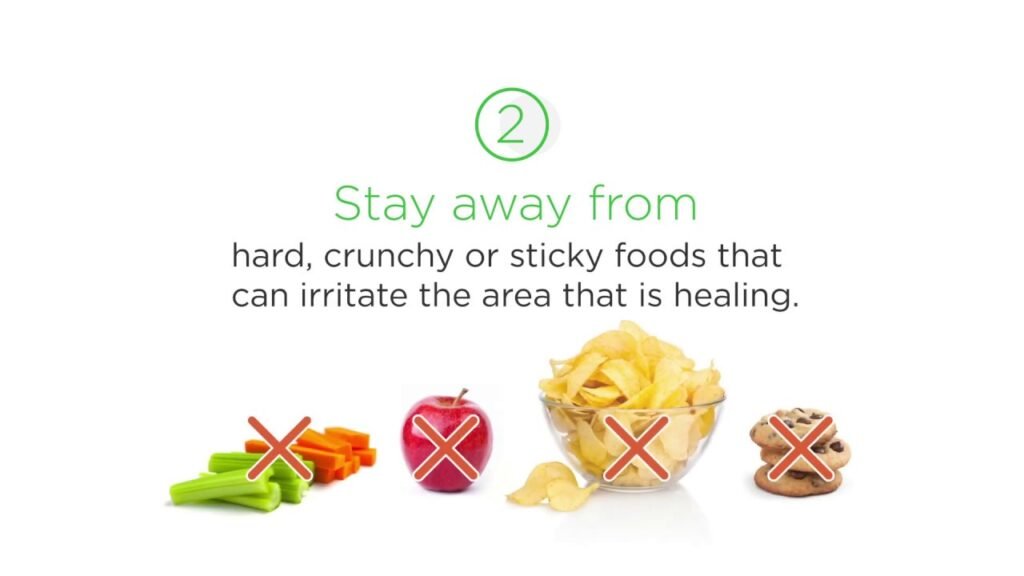Foods to Avoid After Tooth Extraction

After a tooth extraction, it's crucial to be mindful of what you eat to ensure a smooth and speedy recovery. Certain foods can hinder the healing process and even cause discomfort. In this article, we'll explore what foods to avoid after a tooth extraction, as well as provide alternative options to support your recovery. Whether you've recently had a wisdom tooth removed or underwent a dental procedure, knowing what to avoid eating can make all the difference in your post-extraction experience.
What food should you avoid eating after tooth extraction?
After a tooth extraction, it's important to avoid very hard fruits and vegetables such as apples, broccoli, and carrots. These foods can cause severe pain and irritation to sensitive and swollen gums, as well as disrupt the healing process by poking into the incision site. It's best to stick to softer foods that require less pressure to chew, allowing for a smoother and more comfortable recovery after the procedure.
When can you eat normally after tooth extraction?
After a tooth extraction, it is important to follow the guidelines for eating in order to promote proper healing. Initially, it is advised to stick to liquids and very soft foods on the day of the surgery, gradually transitioning back to a regular diet within a day or two. However, it is essential to note that individual cases may vary, and some people may need to follow special dietary instructions depending on the complexity of the extraction or any complications that may arise.
Following a tooth extraction, it is crucial to be mindful of what you eat in order to avoid any potential complications and promote healing. While most individuals can resume their regular diet within a day or two, it is important to listen to your body and follow any specific dietary instructions provided by your dentist or oral surgeon. By adhering to these guidelines, you can ensure a smooth and successful recovery process.
What restrictions are there after tooth extraction?
After a tooth extraction, it is important to avoid activities that create suction in the mouth, such as drinking with a straw, sucking on candy or ice pops, slurping liquids, rinsing your mouth vigorously, or smoking for 24 hours. These actions could dislodge the blood clot that is essential for proper healing. Additionally, it is best to refrain from consuming alcohol or using mouthwash containing alcohol during this time to promote a smooth recovery process.
Post-Extraction Diet: What Not to Eat
After getting a tooth extracted, it's important to follow a specific diet to ensure proper healing. Avoid hard, crunchy foods like nuts, chips, and popcorn, as they can irritate the extraction site and potentially cause complications. Opt for softer, easy-to-chew foods like yogurt, mashed potatoes, and smoothies to give your mouth a break during the healing process.
Stay away from spicy, acidic, and hot foods that can aggravate the extraction site and cause discomfort. These types of foods can also slow down the healing process and increase the risk of infection. Instead, stick to bland and mild options like plain pasta, boiled vegetables, and scrambled eggs to promote faster recovery and minimize any pain or swelling.
Remember to also avoid alcohol, caffeine, and carbonated drinks after getting a tooth extracted. These beverages can interfere with the blood clot formation in the extraction site, leading to a condition called dry socket which can be extremely painful. Stay hydrated with water and herbal teas to aid in the healing process and keep your mouth clean and free from any potential irritants.
Healthy Healing: Foods to Skip After Tooth Removal
After undergoing a tooth removal procedure, it is crucial to follow a proper diet to aid in the healing process and prevent any complications. One of the key foods to avoid after tooth extraction is crunchy or hard foods, as they can irritate the surgical site and potentially dislodge the blood clot, leading to dry socket. Foods such as nuts, chips, and popcorn should be skipped in favor of softer options.
Another group of foods to steer clear of after tooth removal are spicy or acidic foods, as they can cause discomfort and irritation to the healing wound. This includes items like hot sauce, citrus fruits, and vinegar-based dressings. Opting for mild and bland foods during the initial healing period can help prevent any unnecessary pain or complications.
Lastly, it is important to avoid consuming hot foods and beverages after tooth extraction, as they can increase bleeding and slow down the healing process. Instead, opt for lukewarm or cold options like smoothies, yogurt, and soups. Remember to drink plenty of water to stay hydrated and aid in the healing of the surgical site. By being mindful of your diet and avoiding these foods, you can promote healthy healing and a smooth recovery after tooth removal.
Safeguard Your Smile: Avoid These Foods After Extraction
After undergoing a tooth extraction, it is crucial to safeguard your smile by avoiding certain foods that can hinder the healing process. Steer clear of crunchy snacks like nuts and chips, as well as sticky candies and chewy foods that can get lodged in the extraction site. Opt for soft, easy-to-chew options such as yogurt, soup, and mashed potatoes to prevent any irritation or infection. Remember, taking care of your oral health post-extraction is essential for a speedy recovery and maintaining a healthy smile in the long run.
In order to promote a smooth and speedy recovery after a tooth extraction, it is important to steer clear of certain foods that can hinder the healing process. By avoiding hard, crunchy, sticky, and acidic foods, you can help prevent irritation and infection in the extraction site. Instead, focus on consuming soft, nutrient-rich foods that are gentle on your healing gums. By following these guidelines, you can ensure a comfortable and successful recovery from your tooth extraction procedure.